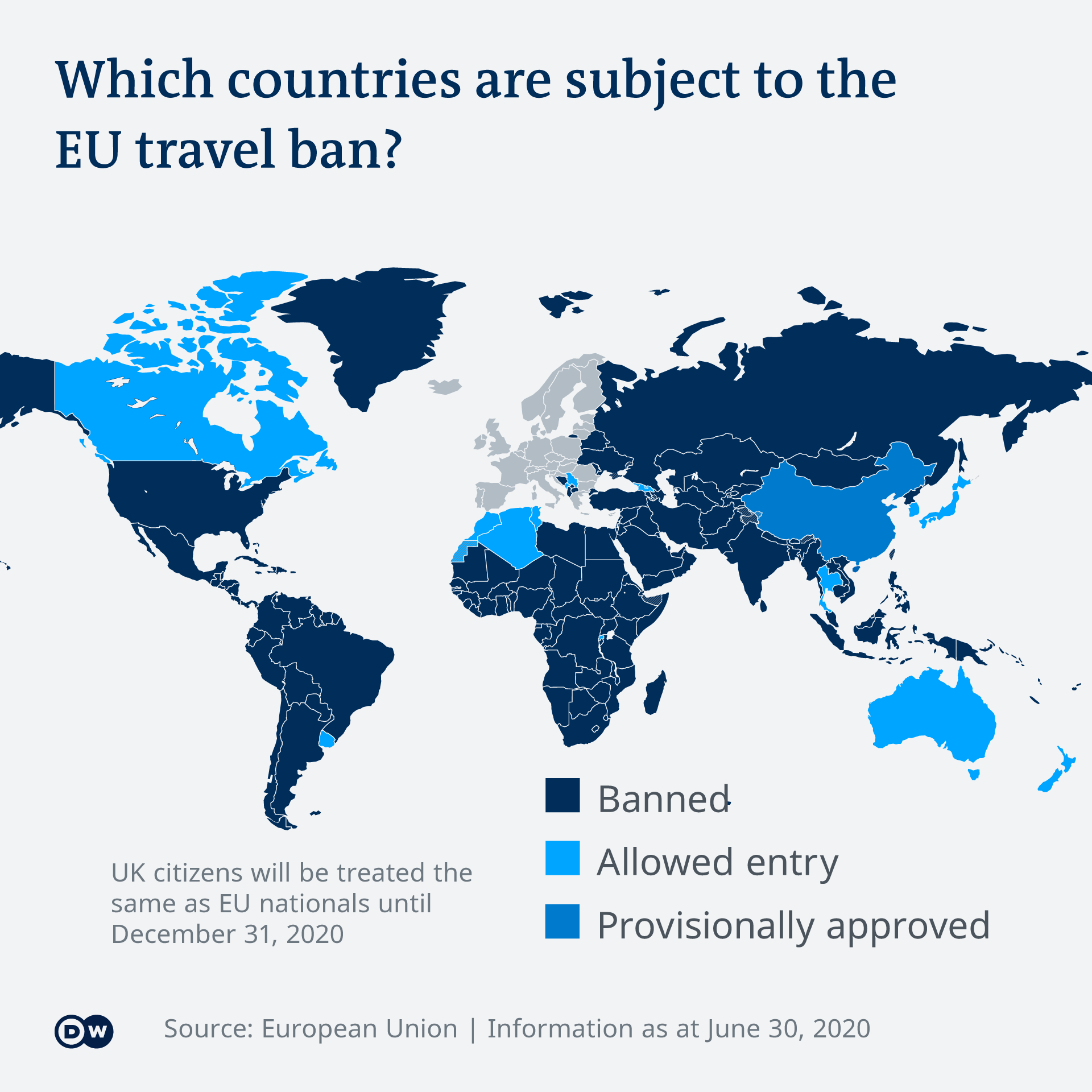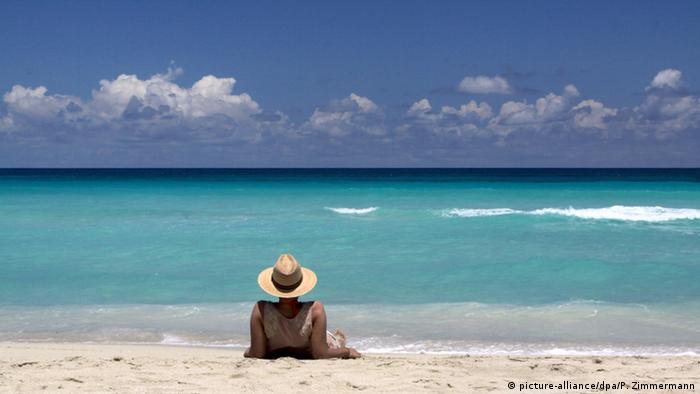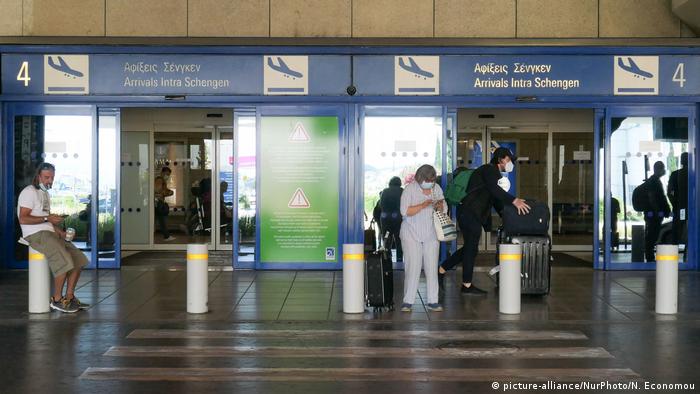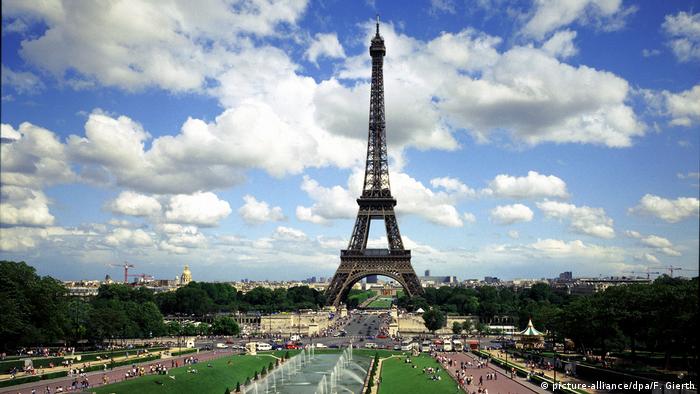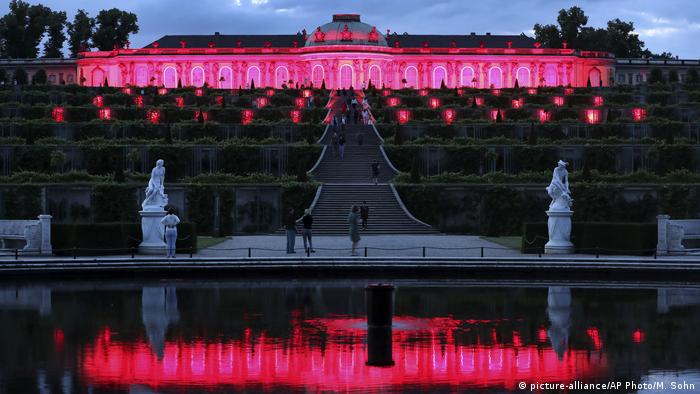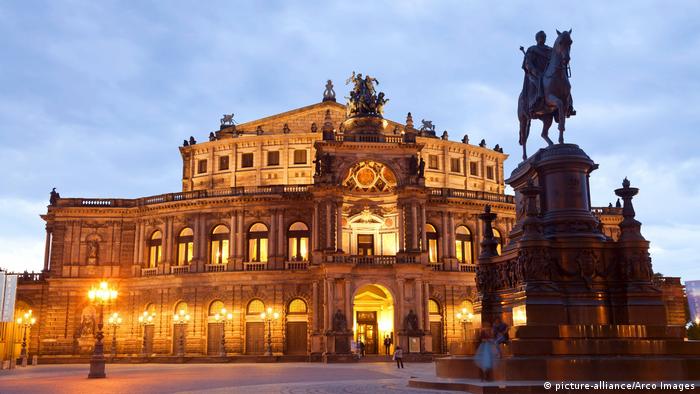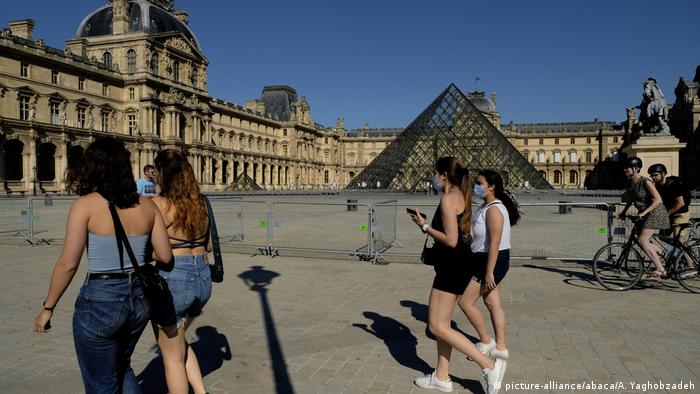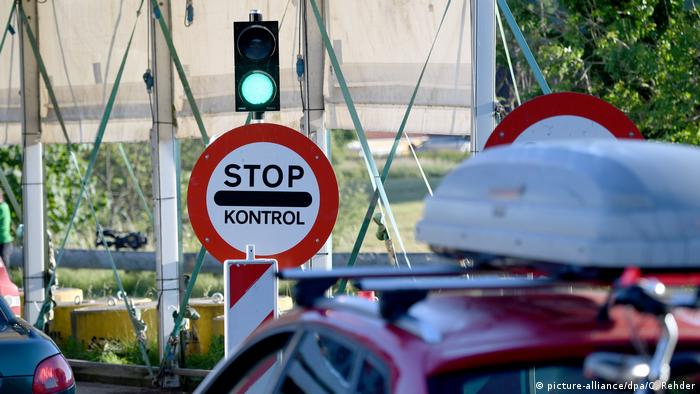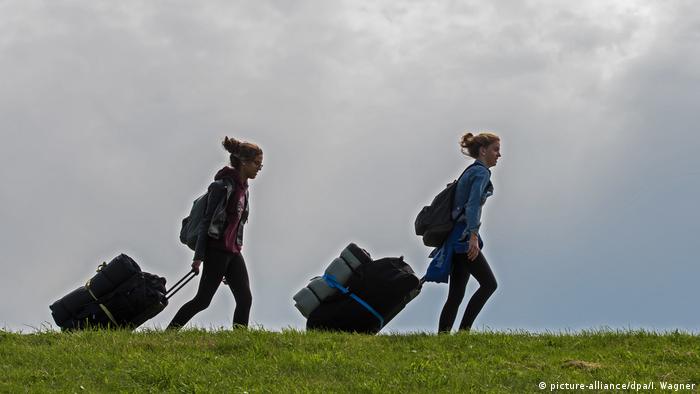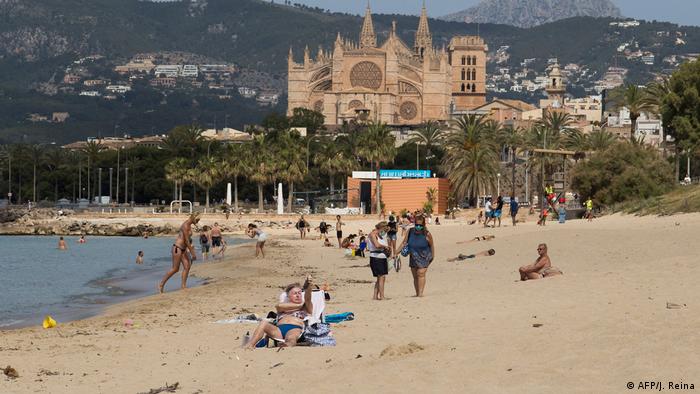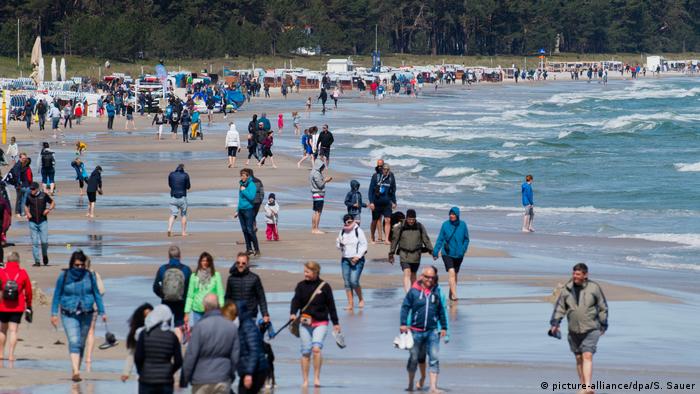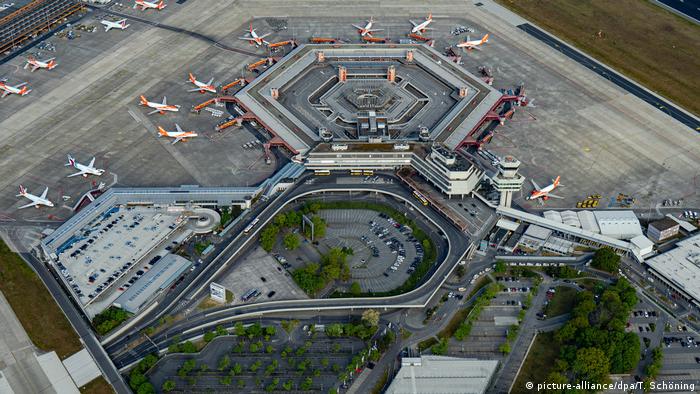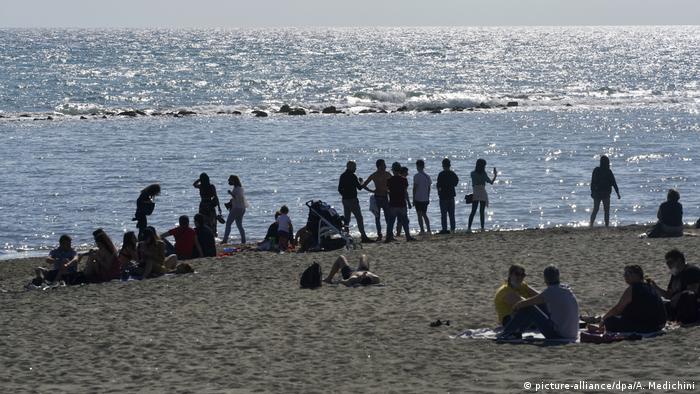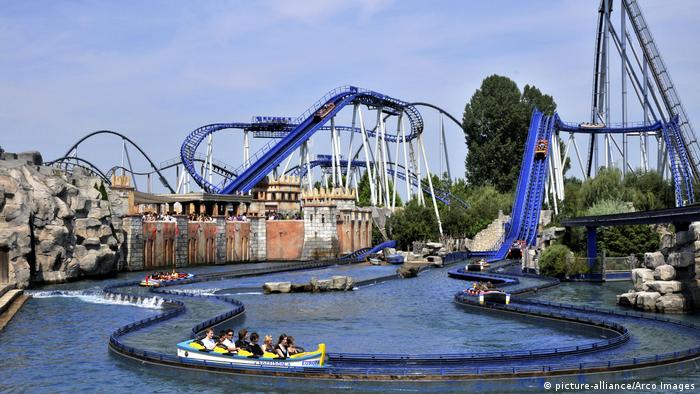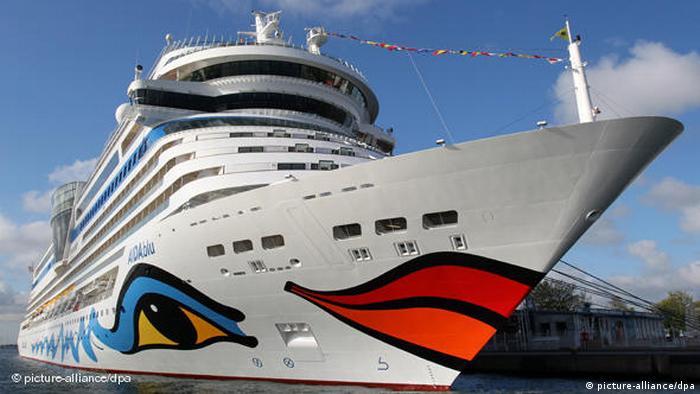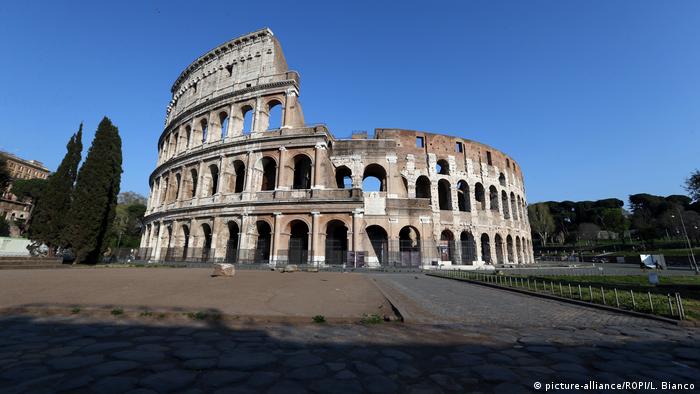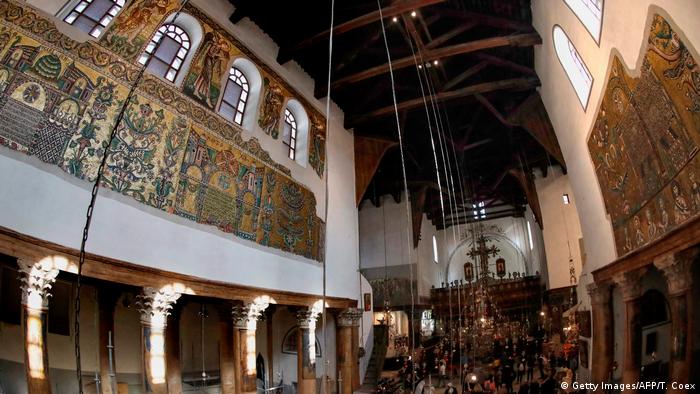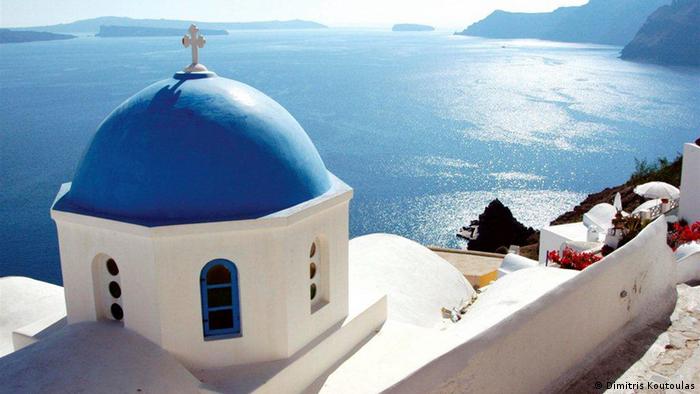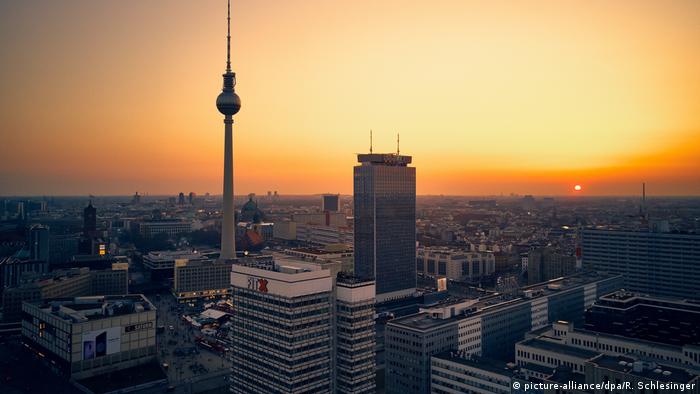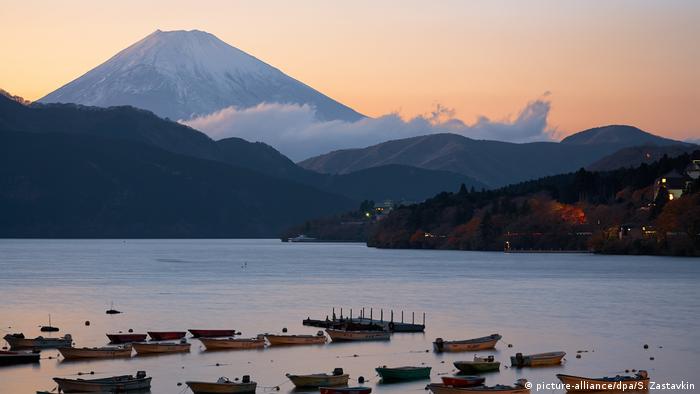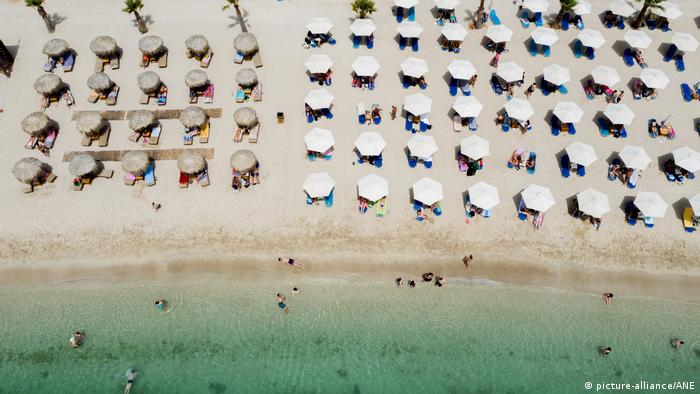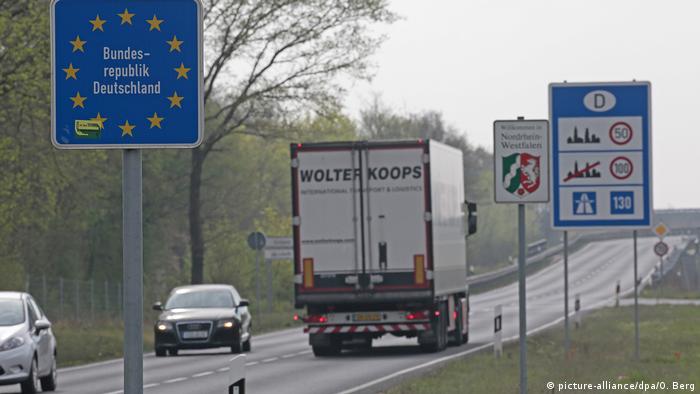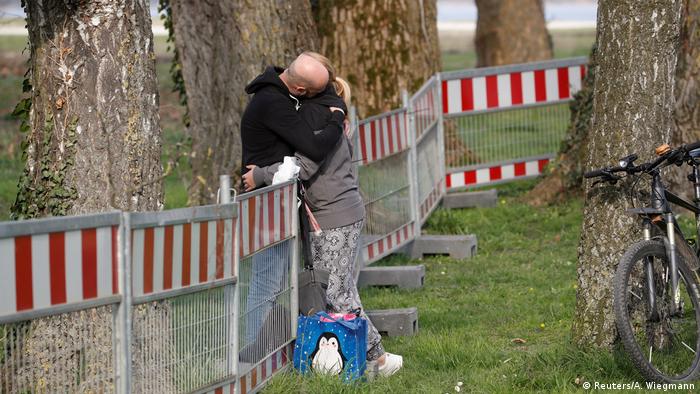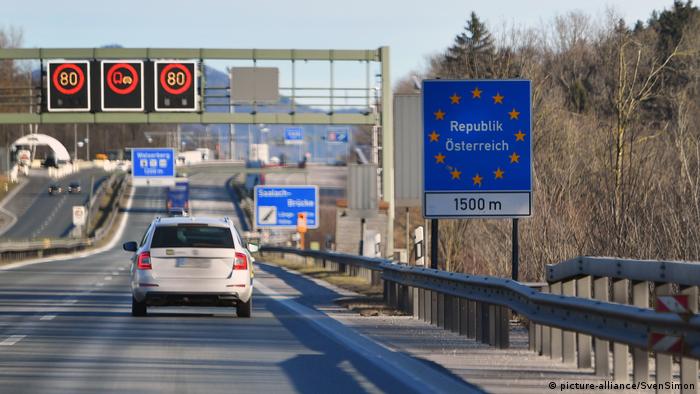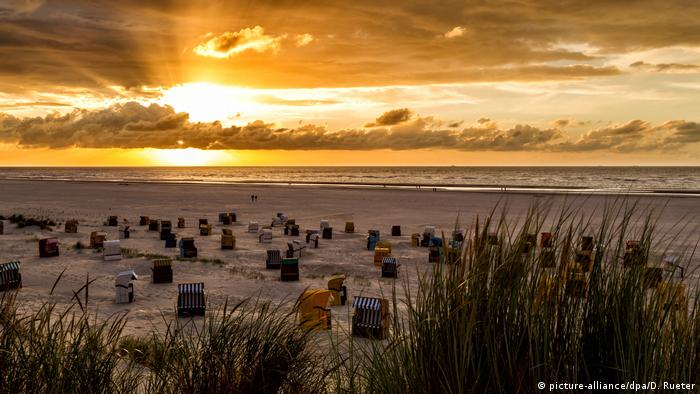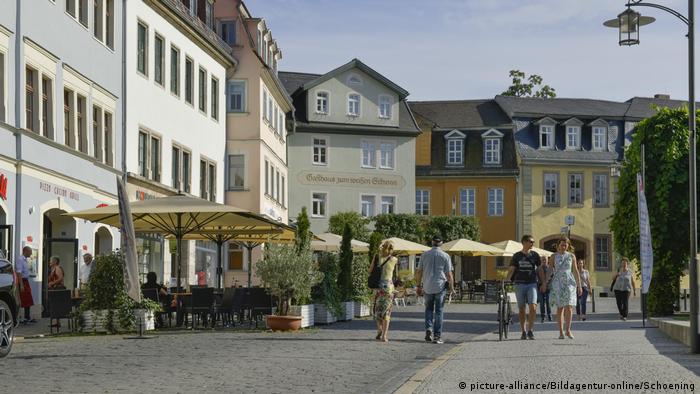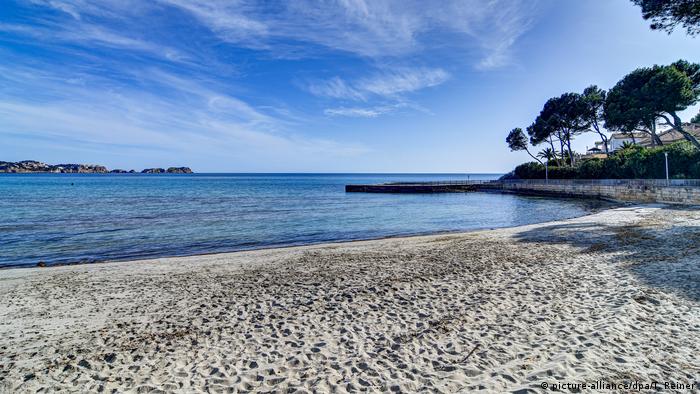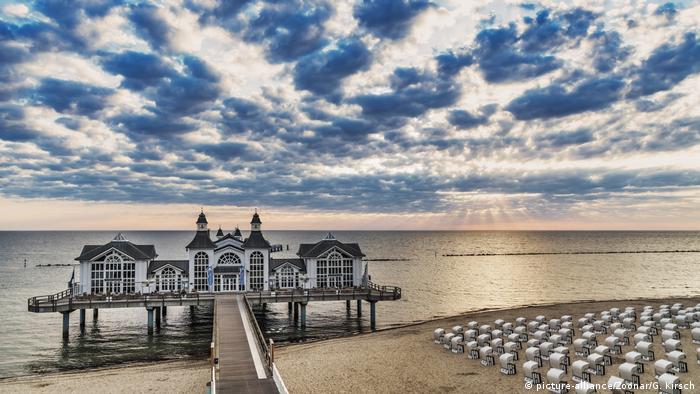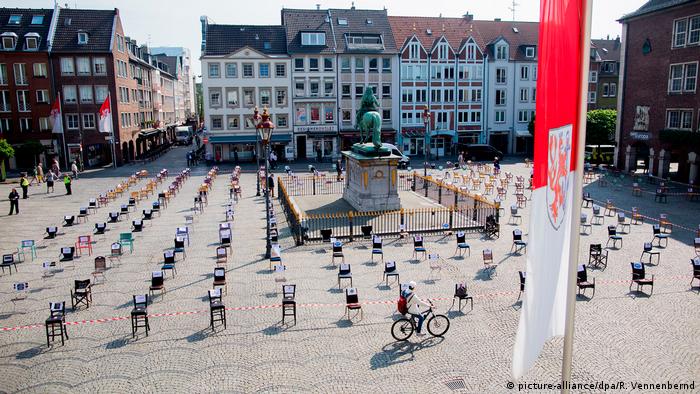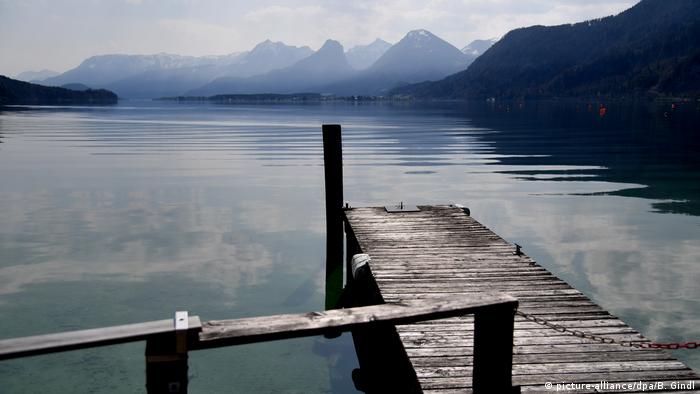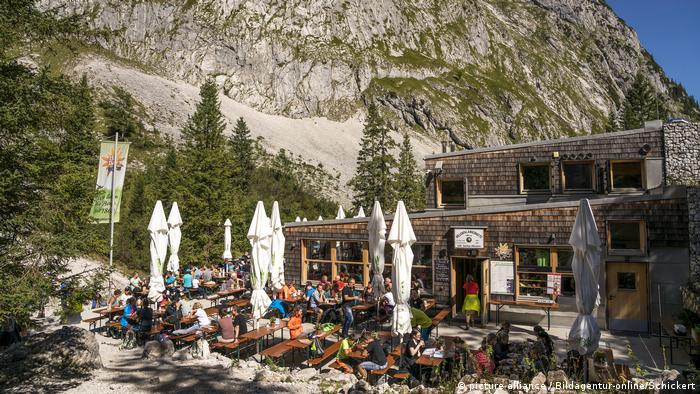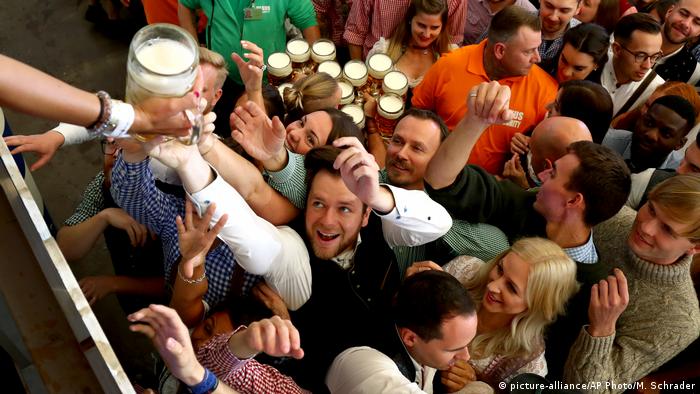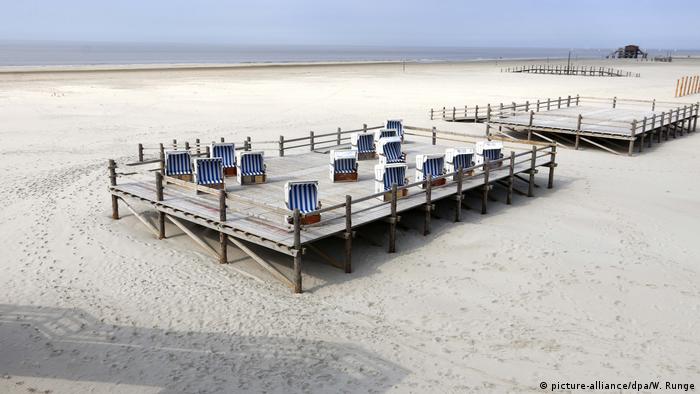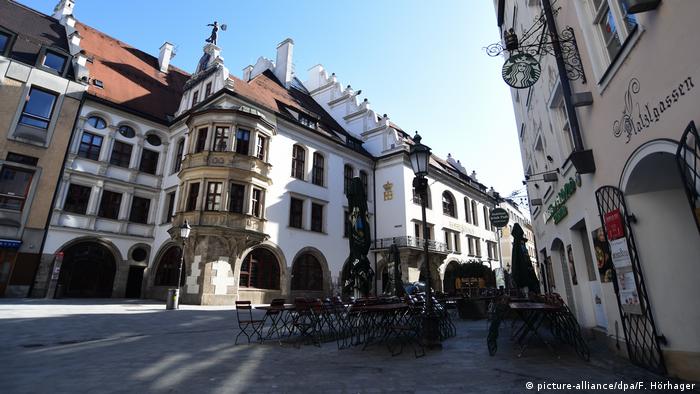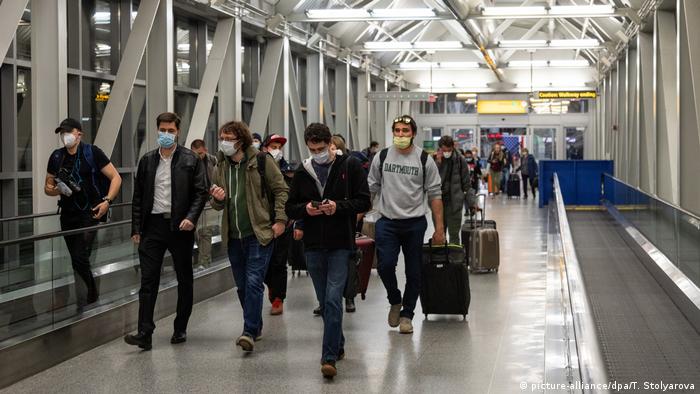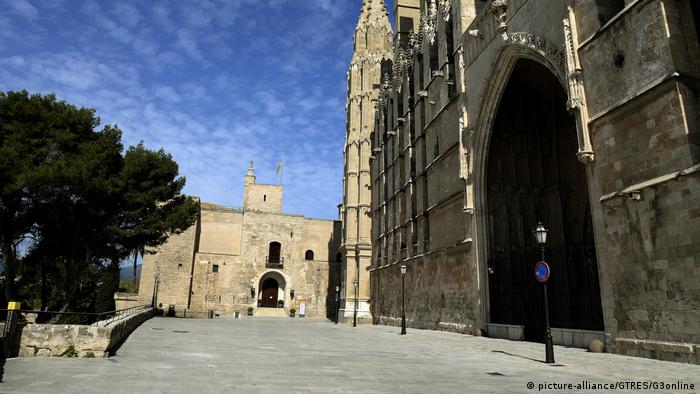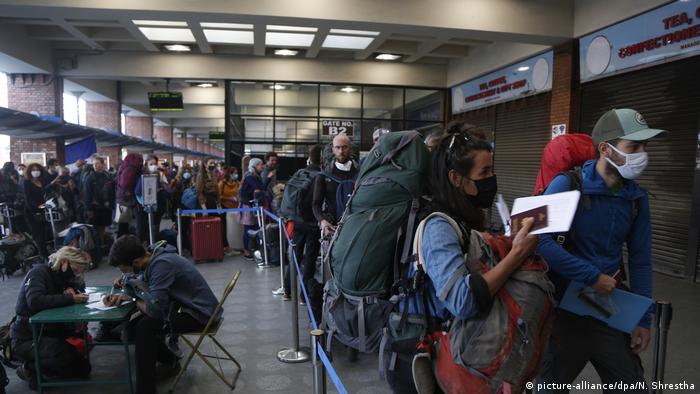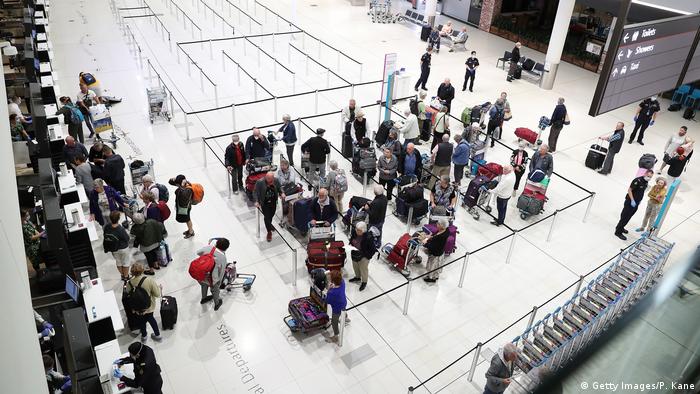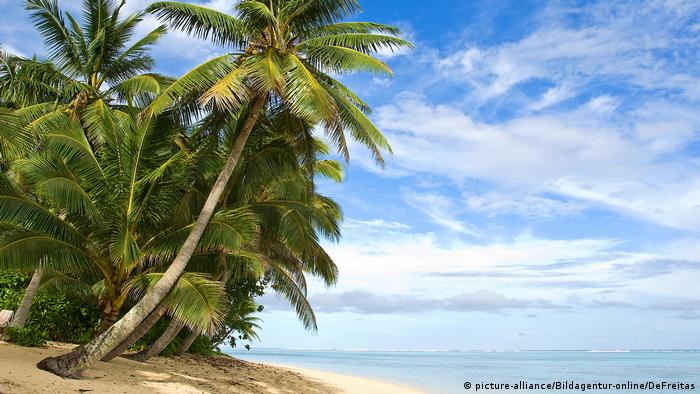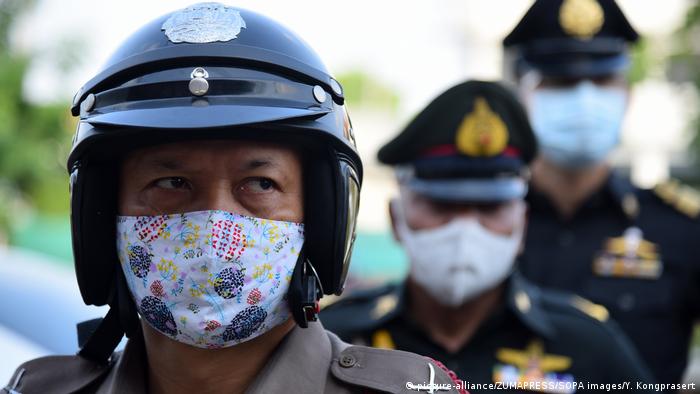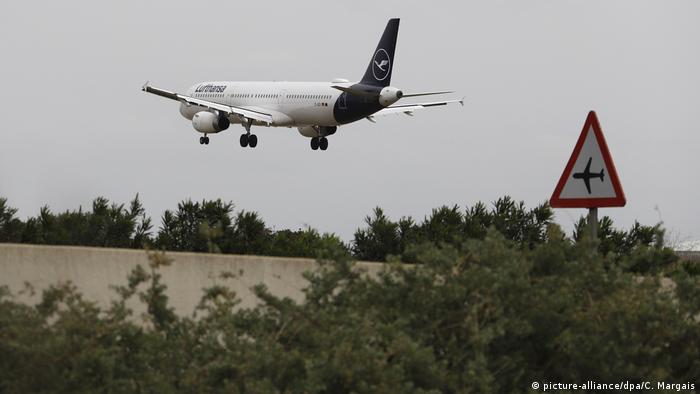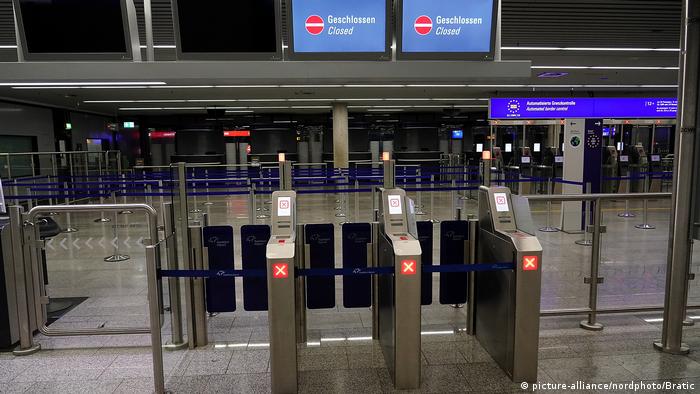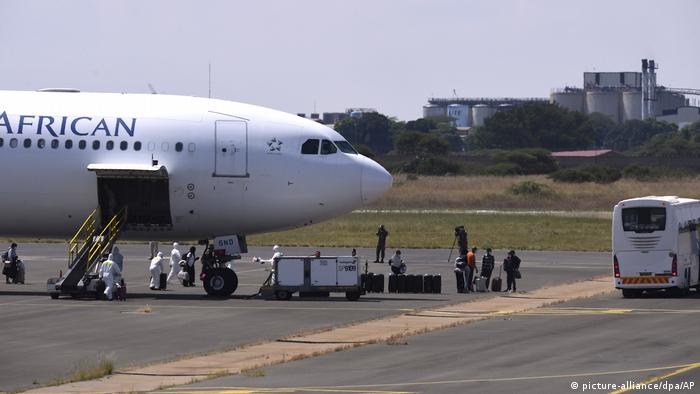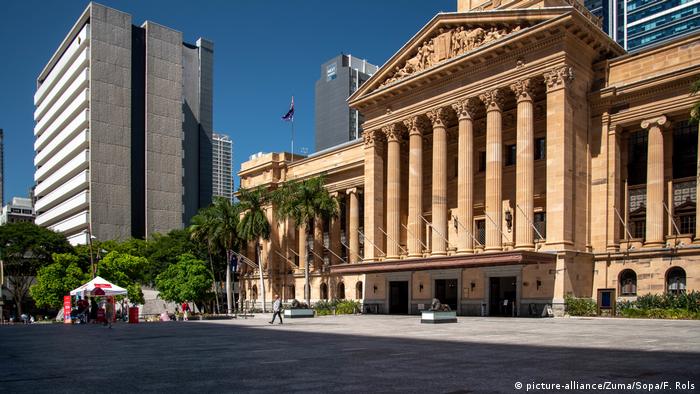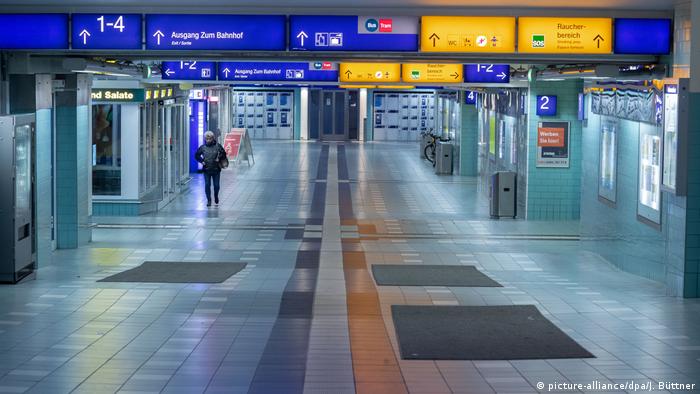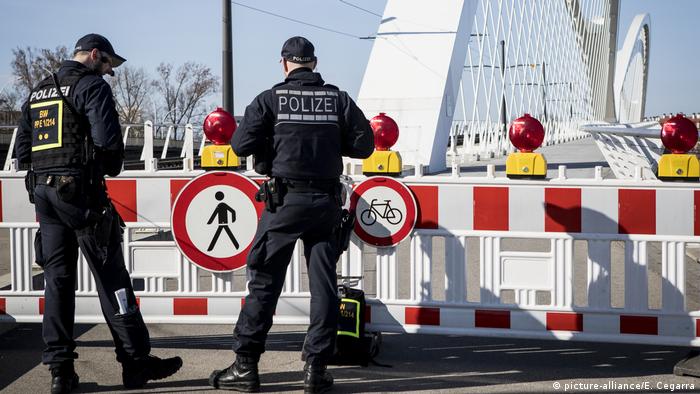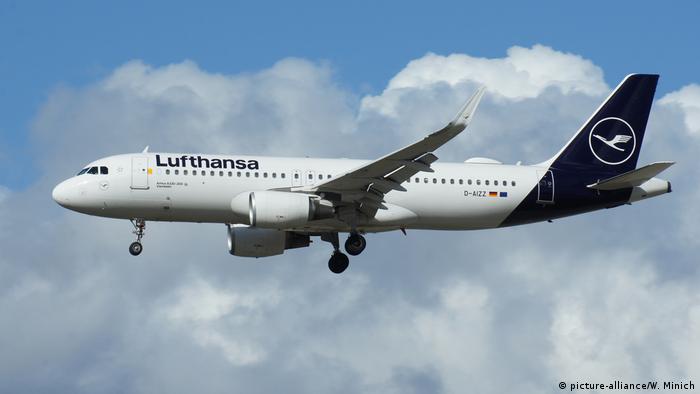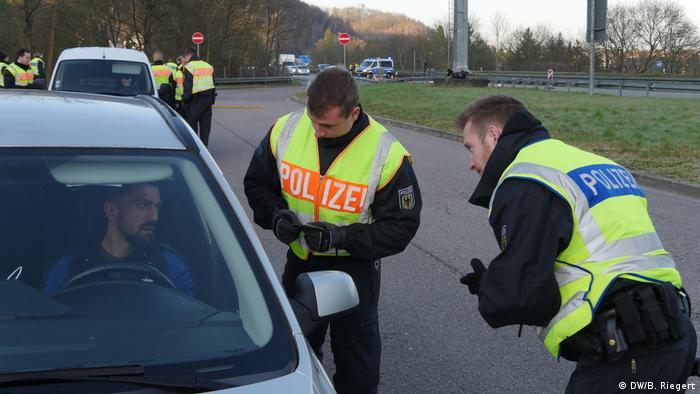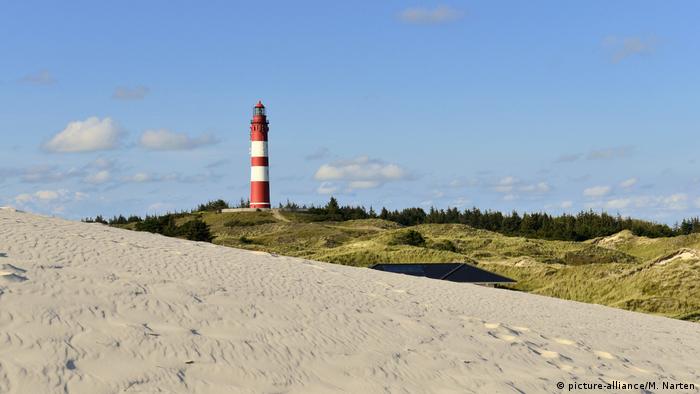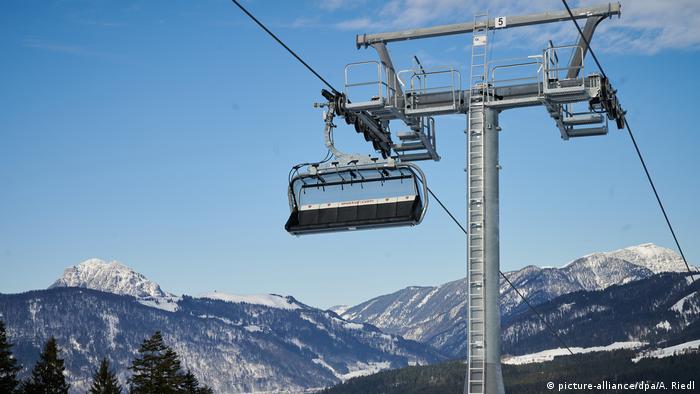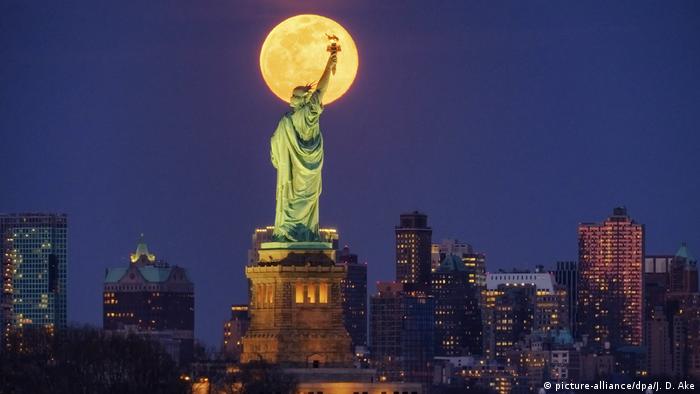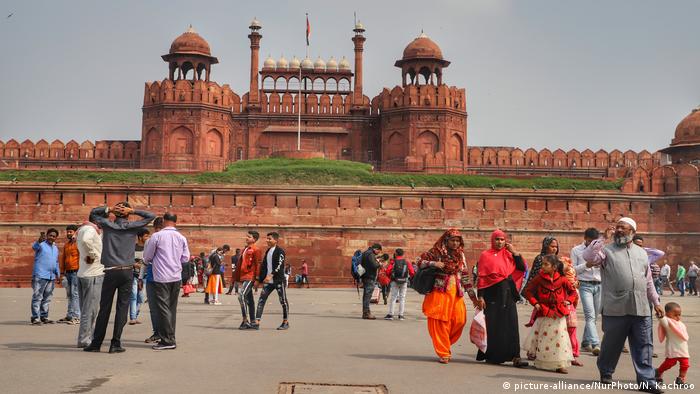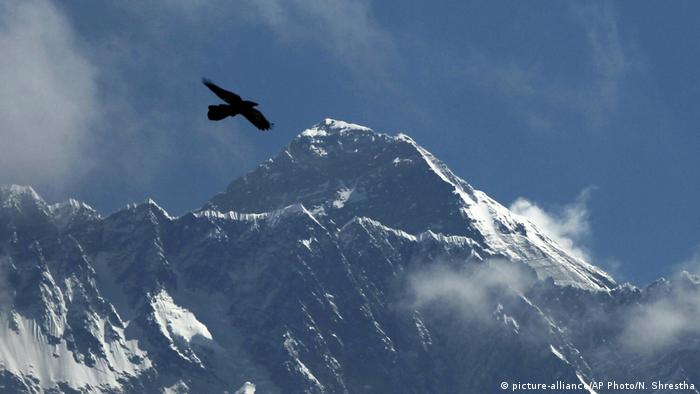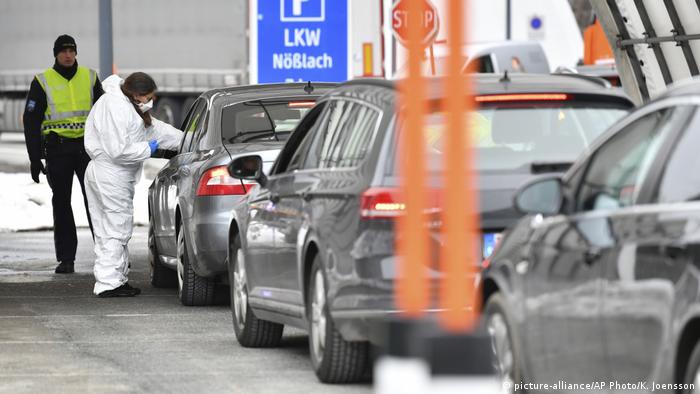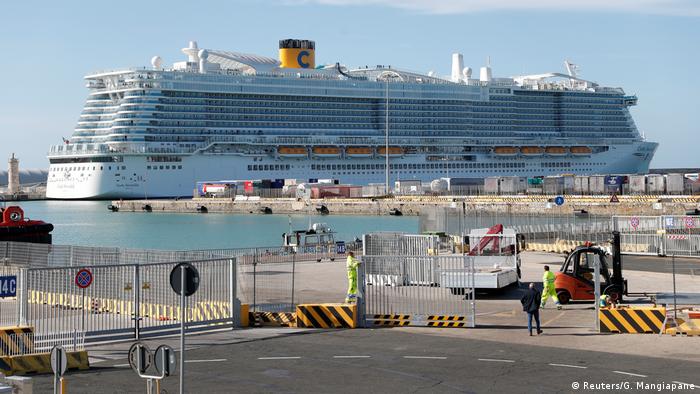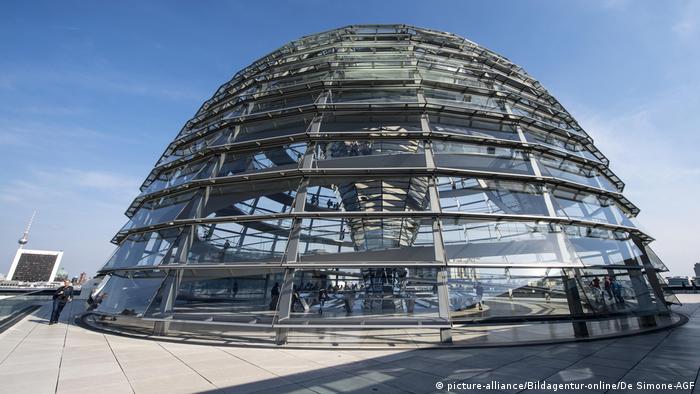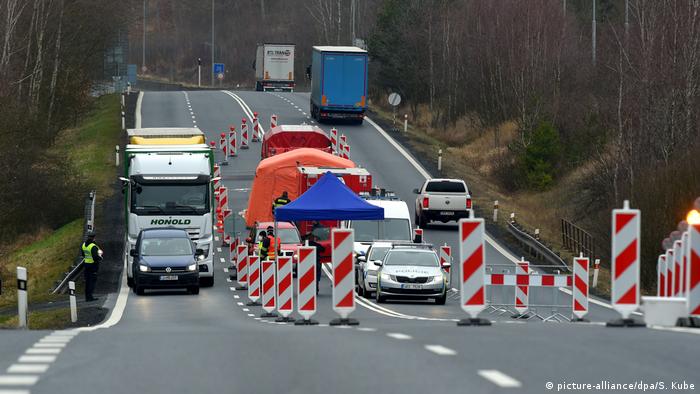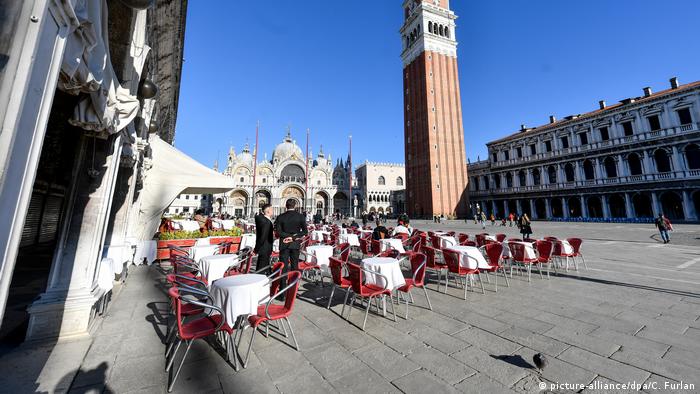The US regained 4.8 million jobs in June, according to official figures. However, some of those jobs could soon disappear again as the country renews shut downs amid an anticipated second wave. Follow DW for the latest.
- US unemployment rate has dropped by two points, to 11.1%
- Germany is set to take on a record €217.8 billion ($245.8 billion) in debt this year due to the pandemic
- The UK plans to scrap quarantine rules for travelers from 75 countries
- Over 10.7 million cases and over 500,000 deaths have been confirmed worldwide
All updates in Universal Coordinated Time (UTC/GMT)
22:30 British Prime Minister Boris Johnson urged people to "act responsibly" when English pubs reopen on Saturday after more than three months of coronavirus lockdown. The British leader also said he plans to visit both a pub and a hairdresser. Libraries, museums, cinemas, restaurants and hotels will also open on Saturday.
Loosening the restrictions "is about supporting the livelihoods of business owners and their employees," Johnson said.
"But the success of these businesses, the livelihoods of those who rely on them, and ultimately the economic health of the whole country is dependent on every single one of us acting responsibly," he added.
A spike in cases in the English city of Leicester, which led to local schools and shops this week being shut again and the July 4 reopenings delayed, was proof that "the virus is still with us."
Britain has suffered the deadliest outbreak of COVID-19 in Europe, recording around 44,000 deaths among patients who tested positive, rising to over 54,000 when suspected cases are included. There have been over 400,000 confirmed COVID-19 infections in the UK.
The British government also said it is scrapping a 14-day quarantine rule for arrivals from a number of countries deemed "lower risk" for the coronavirus, including France, Spain, Germany and Italy.
The change takes effect July 10, just over a month after the UK began requiring international arrivals to self-isolate for two weeks.
The full list of exempted countries will be announced later Friday, the government said. It is considered unlikely the United States, which has the highest number of coronavirus cases and deaths in the world, will be among them.
21:35 Over 10,000 people in Peru have died from the coronavirus, the country's Health Ministry has said. The news came a day after the government began lifting a national lockdown in an attempt to restart the economy.
The number of fatalities rose by 185 to 10,045 in the past 24 hours. The number of infected rose to 292,004.
21:25 The World Health Organization (WHO) said there are 17 potential coronavirus vaccines currently undergoing clinical trials on humans. The most advanced of them is being developed by Oxford University in the UK.
Speaking at the end of a two-day coronavirus research conference, the WHO said it is optimistic about the vaccines, even if the current trials do not succeed.
"We have a broad pipeline with four different types of vaccine," said Ana Maria Henao Restrepo, who is responsible for research and development at WHO.
Researchers are considering over 150 active substances in their search for a vaccine to prevent COVID-19.
Oxford's AZD1222 is the first vaccine to reach phase 3 of a clinical trial. Phase 3 consists of large-scale testing on many people to determine the drug’s safety and effectiveness.
Five other trials are in phase 2 of testing, which consists of trials on a smaller number of patients with health conditions that would reveal the substance's effect.
Phase 1 consists of trials on healthy people in order to test their tolerance.
Trials are also underway at two companies in Germany, Biotech in Mainz and CureVac in Tübingen.
Normally it takes 10 years to 15 years to develop a vaccine. However, the pandemic has pushed researchers, pharmaceutical companies, and regulators to development at an unprecedented speed.
It remains unclear whether a vaccine will be widely available by the end of the year, as WHO scientists Soumya Swaminathan had hoped for last month.
20:20 Spanish Prime Minister Pedro Sanchez said fiscal reform, including tax hikes for larger companies, was "inevitable" if Spain was to recover from the economic crisis spurred by the coronavirus pandemic.
"We will have to reduce public debt, we will also have to lower the public deficit and for that, we will have to increase the state's revenue capacity," Sanchez told LaSexta news channel.
Spain's low tax income made it "inevitable that we will have to carry out fiscal reform," given that government revenues are much lower than the European average, or "7 percentage points lower than GDP," he said.
"We want to have a robust welfare state and we're going to do that with fiscal justice," which will mean "raising taxes on big companies and not on small- and medium-sized companies," he added.
"Big companies have effective tax rates that are under 10% while smaller and medium-sized companies pay a lot more." He also said Spain would seek to "accelerate" the imposition of environmental taxes. Regarding income tax, Sanchez said he considered "that the higher tax brackets could be expanded."
Spain is one of the countries hardest-hit by the pandemic in Europe, implemented one of the strictest lockdowns in the region, which saw businesses shut down for months and citizens unable to leave their homes for nonessential reasons. The country now has almost 250,000 confirmed cases and a death toll above 28,000.
19:25 There is "very little risk" that pets can infect their owners with coronavirus, said Soumya Swaminathan, the World Health Organization’s (WHO) chief scientist.
Felines, ferrets and "even tigers" have been infected with the disease, but "there is very little risk from domestic animals because there was some concern about domestic animals becoming a source of infection," Soumya told a Geneva news conference.
Global concerns were raised in March, when a pet cat was found to be positive for the virus in Hong Kong after its owner tested positive. However, while pets can contract coronavirus and spread it to other animals, there is no evidence of animal-to-human transmission, according to the WHO website.
19:00 The US state of Florida reported a daily record of more than 10,000 new coronavirus cases, as the country grapples with a new surge in infections.
The figure of 10,109 cases, bringing the total to 169,106, marks the second record since Saturday. Florida is a major focus of public health experts, with the fifth highest number in the US.
In another sign of the difficult situation in Florida, Jackson Health System, the largest healthcare provider in Miami, announced Wednesday that it will no longer do non-urgent surgeries, warning that it will run out of hospital beds if the rise in cases seen over the past two weeks continues for another month or two.
Following the latest spike, Miami Beach reinstated a nighttime curfew, and Miami-Dade County made the wearing of masks mandatory. Beaches in south Florida have been shut down ahead of the July 4 holiday weekend, and there will be limited use of pools at hotels and apartment buildings.
17:26 Turkish Foreign Minister Mevlut Cavusoglu has accused the European Union of maintaining its travel restrictions for Turkey for political reasons. When the EU lifted entry bans for 14 countries, Turkey did not make the cut.
Cavusoglu maintained that many of those 14 nations were in a worse position than Turkey.
"We see that they have taken a politically motivated decision," he said in Berlin, after meeting his German counterpart, Heiko Maas.
He called on Germany to "review its travel warning in light of objective data and criteria."
Maas said Germany would align its travel warnings with EU recomendations.
"It is only possible to control the spread of the virus if we in Europe act in as much harmony as possible," Maas said.
People traveling from the following countries are now allowed to enter the EU without quarantining: Algeria, Australia, Canada, Georgia, Japan, Montenegro, Morocco, New Zealand, Rwanda, Serbia, South Korea, Thailand, Tunisia and Uruguay.
13:20 The US unemployment rate for June fell to 11.1% after the US economy regained 4.8 million jobs, according to the Bureau of Labor Statistics.
The unemployment rate was down from the previous 13.3% logged in the spring, with the number of jobs created was far higher than economists expected. The employment rate decreased as businesses began to reopen, and people who were laid off returned to their jobs, especially in hard-hit sectors like leisure and hospitality.
Non-farm payroll employment rose by 4.8 million in June, while those listed as temporary layoffs decreased by 4.8 million people to 10.6 million. However, those figures largely reflect the first weeks of June. Later in the month, the country began to see reopenings paused amid another nationwide spike in coronavirus cases.
A separate Labor Department report showed that job losses continued, as 1.43 million people filed initial claims for unemployment benefits last week – a decrease of just 55,000 from the previous week.
The United States has been the hardest hit by the pandemic, with nearly 2.7 million confirmed cases and a death toll of over 128,000.
12:50 The World Health Organization (WHO) says Africa likely does not have a significant number of unknown cases or deaths from coronavirus, the regional head has announced.
"We do not think that there is a multiple-fold number of cases which are undetected and people who are dying unknown," Dr. Matshidiso Moeti said in a press conference.
"There is a certain level of underestimation of testing," she added. "Most African countries are only testing people who have symptoms and are encouraging people to come with early symptoms."
Some experts have expressed concerns that coronavirus outbreaks may have devastating effects in some African countries and that cases and deaths may be going unreported. Moeti stressed the importance of "strong contact tracing systems" and maintaining travel restrictions where possible.
11:03 Germany will take on a record €217.8 billion ($245.8 billion) in debt this year after lawmakers approved a supplementary budget to help the economy recover from the coronavirus pandemic.
The money is expected to fund measures to support struggling businesses and consumers in the coming months. It pushes Germany's debt-to-GDP ratio to over 75% — significantly higher than the EU's 60% limit.
German MPs passed an initial €156 billion boost to the budget in March to fund a coronavirus aid package and fill a funding gap caused by falling tax revenues. Among its measures, the government has reduced value-added tax, introduced a €300 bonus per child for families, and earmarked almost €25 billion in aid for small- and medium-sized businesses.
Read more: What's in Germany's emergency coronavirus budget?
10:50 Official statistics show that more than half a million jobs have been lost in Italy since the start of the coronavirus outbreak.
In May, the number of people in work fell to 22.8 million, its lowest level in nearly four years, and down by 538,000 compared to February, according to the national statistics office Istat.
Since the coronavirus struck Italy in mid-February, the country has reported more than 240,000 infections and almost 35,000 deaths.
Istat said the unemployment rate in May stood at 7.8%, up from 6.6% in April. The figure is relatively low, in part because of a major increase in people who are not looking for a job. These so-called "inactives" — as well as people temporarily out of work but covered by state-funded furlough schemes — are excluded from job-seeker statistics.
10:42 Germany's agency for international cooperation, GIZ, is warning that the pandemic is hitting developing countries the hardest. Speaking at a press conference in Berlin, GIZ spokeswoman Tanja Gönner said the virus could have a destabilizing effect in some parts of the world, particularly in Africa.
She added that around €110 million ($124 million) had been earmarked for emergency COVID-19 support measures so far this year, and that the hope was to allocate a further €130 million by the end of the year. She said a main priority was sub-Saharan Africa, where the GIZ is funding training for medical personnel, running awareness-raising campaigns, and supplying protective clothing and other materials such as thermometers and soap to hospitals.
-
Coronavirus: The consequences for tourism
Caribbean states reopen for tourists
Cuba, the Dominican Republic and the Bahamas have been letting foreign tourists cross their borders again since July 1. In Cuba, only charter flights and stays in all-inclusive resorts are permitted, which avoid contact with the population. In the Dominican Republic and the Bahamas, hotels and beaches are again open to visitors. There are capacity restrictions and hygiene restrictions.
-
Coronavirus: The consequences for tourism
Development Minister Müller: Reviewing travel restrictions for Africa
Development Minister Gerd Müller has called on the German Foreign Ministry to reassess the coronavirus travel restrictions for Africa. As long as the countries have low infection rates and hygiene standards, there would be no reason to cut them off from tourism. Around 25 million people in Africa live from tourism, for example in Morocco, Egypt, Tunisia or Namibia, Müller said.
-
Coronavirus: The consequences for tourism
EU relaxes entry restrictions
Starting from July 1, people from third countries with low infection rates may enter the EU again as regular travellers. These countries are Algeria, Australia, Canada, Georgia, Japan, Morocco, Montenegro, New Zealand, Rwanda, Serbia, South Korea, Thailand, Tunisia and Uruguay. China will only be considered if it also lifts its entry restrictions for Europeans.
-
Coronavirus: The consequences for tourism
Corona test center opened at Frankfurt Airport
A corona test center has been in operation at Frankfurt Airport since June 29, 2020. Here, passengers both departing and arriving can be tested to avoid quarantine. The standard procedure, in which the results are available as a download within six to eight hours, costs 59 euros. Around 300 tests can be performed per hour.
-
Coronavirus: The consequences for tourism
Paris Eiffel Tower is open again
The Parisian landmark was closed for three months, and now visitors can go up it again. But only in limited numbers and on foot. There are 765 steps to the second floor viewing platform. Wearing a face mask is mandatory. The top of the Eiffel Tower will remain closed until further notice, as will the elevators. The number of tickets on sale is limited and they must be ordered online in advance.
-
Coronavirus: The consequences for tourism
Night of Light - nationwide protest of the event industry
Just like Sanssouci Palace in Potsdam, 8900 buildings in Germany and neighboring states were bathed in red light on Monday (June 22). With the illuminated memorials, the event industry wanted to draw attention to their precarious situation and demand more state aid. Concert halls, music clubs and other event locations have been closed since mid-March and are not generating any income.
-
Coronavirus: The consequences for tourism
Semperoper in Dresden reopens
On June 19, after a three-month coronavirus break, the curtain will rise again at the Semperoper: Anna Netrebko and Yusif Eyvazov will star in the concert performance of Verdi's opera "Don Carlos". The approximately 300 tickets (out a total of 1300 seats) were sold out within 15 minutes. Until the summer break on July 18, there will be further weekend performances at Dresden's Semperoper.
-
Coronavirus: The consequences for tourism
World famous Alhambra in Granada opens again
The Alhambra Castle in Granada in southern Spain will open its doors to tourists again on June 17. Initially, only 4,250 visitors are to be admitted at the same time — only half as many as usual. In addition, masks are mandatory. The Alhambra is considered the most important testimony to Arab architecture in Europe and is a World Heritage site.
-
Coronavirus: The consequences for tourism
"Re-open EU": A website with travel rules for Europe
Entry regulations, masks, quarantine? The new EU overview website "reopen.europa.eu" provides information on the coronavirus rules of individual EU countries — and in 24 languages. Tourists can enter their destination country on the website and find out about regulations that apply there. So far, the site contains information on 27 EU countries and is to be continuously updated.
-
Coronavirus: The consequences for tourism
Germany's borders are open again
During the night of Monday (June 15), the federal police ended the border controls that had been introduced three months ago because of the coronavirus crisis. Complete freedom of travel between Germany and its neighboring countries is back in effect. At the same time, the Foreign Office's travel warnings for 27 European countries ended.
-
Coronavirus: The consequences for tourism
Bookings on Airbnb are picking up again
In Germany, Airbnb accommodation bookings in the past week were 60 per cent higher than a year ago, the global provider announced on June 11. These bookings were mainly for places within a radius of 80 to 320 kilometers (50-220 mi) of the users' home. However, things at Airbnb are far from business as usual. The company had to cut about 1900 jobs worldwide because of the coronavirus crisis.
-
Coronavirus: The consequences for tourism
German government extends worldwide travel ban
The beaches of the world people dream of, like here on Ko Phi Phi in Thailand, will have to do without German tourists. The German government has extended the travel warning for tourists due to the coronavirus pandemic for more than 160 countries outside the EU until August 31. However, exceptions can be made for individual countries where the spread of the virus has been sufficiently contained.
-
Coronavirus: The consequences for tourism
Tourist pilot project launched on Mallorca
6000 Germans will be the first foreign tourists to be allowed to travel to the Balearic Islands from Monday (June 15). According to Spanish media, the pilot project is intended to test the security precautions at airports and hotels before all of Spain opens its borders on July 1. Germany was chosen because the epidemiological situation there is similar to that on the Balearic Islands.
-
Coronavirus: The consequences for tourism
App to regulate beach visits on the Baltic Sea coast
A new app is to help manage the flow of visitors to the Baltic Sea beaches, Schleswig-Holstein's state premier Daniel Günther announced on June 7. Visitors use the app to register their desired time slot on the beach. If there is enough space available, they will be given an access authorization. The municipality of Scharbeutz developed the system, which could now also be used by other places.
-
Coronavirus: The consequences for tourism
Las Vegas reopens casinos
After having to close because of the coronavirus crisis, the casinos in Las Vegas reopened on Thursday (June 5). Hygiene precautions are to reduce the risk of infection. Visitor capacity has been reduced to half, plexiglass panels separate players from croupiers, and the casino tokens (chips) are regularly disinfected. Nightclubs and big shows in the casinos are still not allowed at the moment.
-
Coronavirus: The consequences for tourism
Tegel Airport to remain open — for the time being
Berlin's Tegel Airport will not be temporarily closed after all. Airport manager Engelbert Lütke Daldrup said on Wednesday (June 3) that the number of passengers was even expected to rise again. Earlier, the German government had announced that it would lift its travel warnings for 29 European countries on June 15. On that day, Tegel was supposed to go off the grid.
-
Coronavirus: The consequences for tourism
Italy reopened for Europeans
Starting on Wednesday (June 3), tourists from Europe have been allowed to enter Italy again, the country that was one of the worst hit by the coronavirus pandemic worldwide. A two-week quarantine for travellers from Europe is no longer required. This should save the travel season. Italians will again be able to move freely throughout the country and travel to other regions.
-
Coronavirus: The consequences for tourism
Neuschwanstein Castle is open again
Neuschwanstein Castle — since Tuesday June 2 — is again open to tourists. Previously, the Bavarian state government had made a whole range of tourist attractions such as the boat trip on Lake Starnberg or Nymphenburg Castle accessible again. One of the attractions that will remain closed due to the coronavirus because of restricted space is the royal house at Schachen.
-
Coronavirus: The consequences for tourism
Cable cars in Bavaria are back in operation
The Zugspitze, Germany's highest mountain at 2962 meters (9718 ft.), is accessible again. From Saturday (May 30) the cable cars and chair lifts in Bavaria are allowed to run again. Physical distancing and compulsory facemasks are a matter of course, the number of passengers is limited to 35% of the transport capacity. The first mountain huts are also opening again.
-
Coronavirus: The consequences for tourism
Roller coasters are running again at Europapark Rust
This is the first large amusement park in the world to resume operations. Rules are: Facemasks must be worn in the queue and every second seat must be left empty. More than 2.5 million tickets have already been requested online for the coming weeks. The Europapark Rust, located in the triangle of Germany, France and Switzerland, attracted 5.7 million visitors last year.
-
Coronavirus: The consequences for tourism
Aida cancels cruises until end of July
The 14 cruise ships of the German Rostock-based shipping company Aida Cruises will remain in port until July 31. In many holiday destination countries the regulations for international tourism are still being discussed, the company announced. The Italian shipping company Costa is also extending the cruise suspension for its fleet until July 31.
-
Coronavirus: The consequences for tourism
Colosseum and other sights in Italy open again
Rome's 2,000-year-old landmark can finally be visited again from June 1, and the Vatican Museums will also reopen on that day. Ancient Pompeii, south of Naples at the foot of Mount Vesuvius, is already welcoming visitors again, but only those from within the country. From June 3, however, foreign tourists will be able to return to Italy and visit the ancient sites.
-
Coronavirus: The consequences for tourism
The Church of the Nativity in Bethlehem can be visited again
From today (May 26) one of the most sacred places of Christianity will be open to the public again. Only 50 people can enter the Church of the Nativity in Bethlehem; wearing facemasks is compulsory. While Jews have already been allowed to pray again at the Western Wall also known as the Wailing Wall, in Jerusalem, the Al-Aqsa Mosque on the Temple Mount is to open to Muslims at the end of the week.
-
Coronavirus: The consequences for tourism
Tourism on Greek islands starts again
From Monday (May 25), Greece's islands will be accessible again by plane and ferry for domestic tourists. Taverns, bars and cafes are reopening nationwide. Ferries are to sell only 50% of their tickets, and taverns are only allowed to occupy half of their tables. The list of countries from which foreign tourists can enter Greece without a two-week quarantine will be announced at the end of May.
-
Coronavirus: The consequences for tourism
Berlin Television Tower reopens
Starting on May 22, visitors will again be allowed on to the viewing platform and restaurant of the Berlin TV tower. Only about 50 people are allowed in at any one time, masks are mandatory, and tickets must be reserved online. At 368 meters (1207 ft.), the Berlin Television Tower is the tallest building in Germany and a popular tourist hotspot.
-
Coronavirus: The consequences for tourism
Climbing season on Japan's highest mountain Fuji cancelled
Due to the coronavirus pandemic, Japanese authorities have imposed a climbing ban on Mount Fuji on May 18, and all four routes on the mountain have been closed. Normally during the climbing season in summer, which lasts only two months, thousands of people climb the slopes of the volcano daily in single file. At 3,776 meters (12,389 feet), the mountain is the highest in Japan.
-
Coronavirus: The consequences for tourism
Successful start of the beach season in Greece
In Greece, all beaches in the country were reopened on May 16. According to media reports, strict regulations were observed: The distance between parasols had to be four meters and only two sunbeds per parasol were allowed. Beach bars could only sell packaged food and not serve alcohol. Is this a preview of summer holidays in Europe despite the coronavirus pandemic?
-
Coronavirus: The consequences for tourism
Quarantine restrictions for entry into Germany to be relaxed
From May 15, people entering North Rhine-Westphalia from other EU countries and Schengen states no longer have to go into a 14-day home quarantine. The other German states are to follow in the next few days. Iceland, Norway, Liechtenstein and Switzerland are also exempt from the quarantine regulations, making travel to neighboring countries much easier.
-
Coronavirus: The consequences for tourism
Borders are opening, for lovers too
On May 16, Germany opened its borders to neighboring countries France, Austria and Switzerland. There will only be random checks, and no more checks at all for Luxembourg. However, there must still be "good" reasons for crossing the border. And love is accepted as such. For example, German-Swiss couples at Lake Constance (photo) — can visit each other again.
-
Coronavirus: The consequences for tourism
Austria to open border to Germany again
The Austrian government has announced that the border with Germany will be opened on June 15. Tourism in Austria has been effectively suspended due to the coronavirus pandemic. On May 29, hotels and other accommodation in Austria will be allowed to reopen. Austrian tourism is heavily dependent on guests from Germany.
-
Coronavirus: The consequences for tourism
Start of the season on the North Sea Islands
Borkum, Juist (photo) and the other East Frisian islands are happy to be able to greet tourists again, even if it's a limited surge of visitors. Since May 11, overnight stays in holiday apartments and camping sites throughout Lower Saxony have been allowed again. Holidaymakers must stay at least one week. However, day tourists and hotel overnight stays are still prohibited.
-
Coronavirus: The consequences for tourism
Weimar permits outdoor catering again
Thuringians are pioneers. Weimar is the first city in Germany to reopen restaurants and cafés. Since May 6, people have been sitting in the sun with a coffee or beer and enjoying a step back towards normality — while keeping their distance. Restaurants and hotels in the other federal states will also resume their limited operations by the end of May.
-
Coronavirus: The consequences for tourism
Will travel within Europe soon be possible again?
Holidaymakers might also be able to travel to the Balearic or Greek Islands in summer. "If there are very few new infections there and the medical care works, one could also think about a summer holiday in those places", the government's commissioner for tourism, Thomas Bareiss, told the Tagesspiegel newpaper. Long-distance travel, however, is likely to be cancelled this summer.
-
Coronavirus: The consequences for tourism
Bavaria's beer gardens reopen
On May 18, the coronavirus lockdown for Bavaria's outdoor gastronomy ended and the beer gardens have reopened. Of course under strict conditions — waiters have to wear masks, for example. On May 25, indoor gastronomy is to follow, restaurants and cafes, with a limited number of guests. From May 30, the operation of hotels, and holiday homes in Bavaria will be allowed again.
-
Coronavirus: The consequences for tourism
Holiday season at the Baltic Sea to start
Mecklenburg-Western Pomerania is the first federal state to reopen to tourists from all over Germany: From May 25th they can again stay in hotels, guest houses and holiday homes. 60 percent of the bed capacity will be released for this purpose. This means that the tourist season can start with the Whitsun holidays in popular holiday regions like the Baltic Sea and the Mecklenburg Lake District.
-
Coronavirus: The consequences for tourism
Forbidden City in Beijing will reopen
One of Beijing's most important sights can be visited again after months of closure due to the coronavirus crisis. From Friday (May 1), visitors are allowed back into the palace complex on Tiananmen Square under strict security conditions. Instead of the previously usual 80,000 visitors, a maximum of 5,000 guests are to be admitted daily.
-
Coronavirus: The consequences for tourism
Germany extends worldwide travel warning
Germany extended on Wednesday (April 29) its worldwide travel warning due to the coronavirus crisis to at least June 14. The Federal Foreign Office said that "severe and drastic restrictions in international air and travel traffic and worldwide entry restrictions, quarantine measures and restrictions on public life in many countries can still be expected."
-
Coronavirus: The consequences for tourism
Empty chairs a warning from restaurant owners
Gastronomes have set up empty chairs in central locations in Germany, such as here in Düsseldorf, to draw attention to their situation in the coronavirus crisis. "Without direct financial aid, most of our businesses will not survive," says Guido Zöllick, President of the German Hotel and Restaurant Association. "Suppliers and partners are also increasingly being drawn deeper into economic crisis."
-
Coronavirus: The consequences for tourism
Travel between Austria and Germany will soon be possible again
Austria's Chancellor Sebastian Kurz is confident that the border between Austria and Germany will soon be opened again for tourists. Both countries are on the right track in containing the spread of the coronavirus, Kurz told ARD television on Wednesday (April 22). This is the precondition for a revival of tourism. He did not name an exact date for the opening of borders.
-
Coronavirus: The consequences for tourism
Not a normal holiday season this summer
"A normal holiday season with crowded beach bars and busy mountain huts will not be possible this summer. That would be unacceptable," German Foreign Minister Heiko Maas said on Tuesday (April 21). However, he did not rule out the possibility that borders for tourists could be reopened before the summer and that holiday travel with certain restrictions might be possible.
-
Coronavirus: The consequences for tourism
The Oktoberfest in Munich has been cancelled
The Oktoberfest has been cancelled this year due to the coronavirus pandemic. Bavaria's premier Markus Söder and Munich's mayor Dieter Reiter announced the decision on Tuesday (April 21). "It pains us, and it is a great pity", said Söder. But in times of the coronavirus, the danger of infection at the folk festival, which attracts about six million visitors annually, would just be too great.
-
Coronavirus: The consequences for tourism
Schleswig-Holstein hopes for summer tourism
The Prime Minister of Schleswig-Holstein, Daniel Günther, hopes that tourism on the North and Baltic Seas will be revived in the summer. Despite the coronavirus crisis, he "definitely did not write off the summer tourism business," he said on April 19. While they are now proscribed, stays in secondary residences, holiday homes and finally hotels could be made possible again in three steps.
-
Coronavirus: The consequences for tourism
Poor outlook for tourism
The government resolutions (April 15th) stipulate that people in Germany should continue to refrain from making private trips. The worldwide travel warning is to be upheld. Accommodation offers are only available for necessary and explicitly non-touristic purposes. Restaurants will also remain closed. Tourism is one of the industries that has been hit hardest in the coronavirus crisis.
-
Coronavirus: The consequences for tourism
US entry ban from Europe to remain in place for the time being
The entry ban imposed by the USA on foreign nationals from Europe will remain in place for the time being. Italy and Spain are still struggling with the coronavirus crisis and France has just extended measures to contain infections by the virus, US President Donald Trump said on Monday (April 13). The entry ban will remain in force until the countries show signs of improvement, Trump said.
-
Coronavirus: The consequences for tourism
Mallorca worried about the summer
Hotels, cafes and souvenir shops are closed. It is unusually empty outside the Royal Palace in Palma (picture). The Easter season on the Spanish holiday island of Mallorca has been cancelled. The Majorcan hotel association now fears that due to the uncertain situation in the main markets of Germany and Great Britain, some hotels will remain closed even during the peak season.
-
Coronavirus: The consequences for tourism
More Germans brought back from abroad
By Sunday (April, 5) 205,000 travelers had been brought back to Germany, according to the federal government. Airplanes from Peru and Colombia were the most recent to take off. More than 40,000 Germans however are still stranded abroad. Foreign Minister Heiko Maas said on Twitter. "We will continue our efforts to find solutions for the travelers who have not yet been able to return."
-
Coronavirus: The consequences for tourism
New Zealand lets tourists leave
Thousands of foreigners stranded in New Zealand because of the coronavirus crisis will be able to leave the Pacific state from Friday (April 3). On Thursday, the New Zealand government announced that it would allow the "safe and orderly departure of tens of thousands" of stranded people. Earlier it had stopped return flights by foreign governments.
-
Coronavirus: The consequences for tourism
A symbol of hope
A light installation on the Matterhorn in Switzerland is giving a sign of solidarity and hope in the fight against the corona virus. Encouraging messages are also being projected on to many other tourist landmarks around the world. "Stay safe", "Stay at home" could be see on Monday evening on the Great Pyramid in Giza near the Egyptian capital Cairo.
-
Coronavirus: The consequences for tourism
Repatriation mission will take at least two more weeks
The repatriation process for Germans stranded abroad is ongoing. Until now, main destinations such as Egypt or Morocco have been addressed. "It will be more difficult with countries that only have small groups of scattered adventure vacationers," said the crisis manager of the German Foreign Office. Tourists in the Pacific Islands must first be rounded up in New Zealand and then flown out.
-
Coronavirus: The consequences for tourism
Thailand closes its borders
After long delays Thailand closed its borders on Thursday (March 26). The authorities had delayed the decision for a long time to safeguard the tourism sector. Now tens of thousands of tourists are stuck in the Southeast Asian tourist country. The German government has so far not organized a repatriation for German tourists, as Thailand is not considered a risk region.
-
Coronavirus: The consequences for tourism
Huge repatrition drive
The German foreign ministry announced on Wednesday (March 25) that, together with tour operators, it had brought back more than 150,000 Germans from abroad. Tour operator TUI added that almost 95 percent of the tourists who were stranded because of the coronavirus pandemic are now back in Germany. They were mainly flown out from Egypt, Spain, Portugal and the Cape Verde Islands.
-
Coronavirus: The consequences for tourism
Travel warning extended
German Foreign Minister Heiko Maas has said that the warning against traveling abroad will remain in effect until the end of April. "This includes the Easter holidays," he said on Twitter. "Stay at home! Protect yourself and your fellow human beings," he appealed to the population. Many tour operators have also extended their travel ban until the end of April.
-
Coronavirus: The consequences for tourism
EU pays for return to Europe
The EU Commission is supporting the return to Europe of tens of thousands of long-distance travellers. It intends to cover a large part of the costs, since most of the flight connections have been cancelled. "We are here to help them return," Commission President Ursula von der Leyen said in a video message.
-
Coronavirus: The consequences for tourism
Africa's measures to deal with the pandemic
African countries have also ordered numerous measures to prevent the spread of the coronavirus. South Africa, for example, has banned access to the country for people coming from risk areas. Nigeria is monitoring the temperature of travelers at airports, ports and borders. Cameroon has closed its borders indefinitely.
-
Coronavirus: The consequences for tourism
Australia bans foreign travel
The Australian government has imposed an indefinite ban on all foreign travel by its citizens. Prime Minister Scott Morrison also called on all Australians who are abroad to return home. A 14-day compulsory quarantine for all people entering the country has already been in place for some time. Here, too, it has become quiet in the cities.
-
Coronavirus: The consequences for tourism
Tourism in Germany comes to a halt
The coronavirus crisis is impacting travelers and the tourism industry with full force. Several tour operators, including TUI, has cancelled trips, and some airlines are shutting down. Germany's federal and state governments decided that overnight stays should only be used for "necessary and explicitly not for touristic purposes". Germans are to "no longer take holiday trips at home and abroad".
-
Coronavirus: The consequences for tourism
EU external borders closed
The EU has closed its entire external borders for 30 days as from Tuesday (March 17, 2020). "All travel between non-European countries and the European Union will be suspended for 30 days," French President Macron said in a television address on Monday (March 16,2020) evening. The Schengen Area, which includes several non-EU countries, has also closed its external borders.
-
Coronavirus: The consequences for tourism
Germany brings travelers back home
More and more countries are sealing their borders, and many flights are cancelled. With special flights Lufthansa and its subsidiary Eurowings want to bring up to 6,500 stranded holidaymakers from the Caribbean, the Canary Islands and on Mallorca back to Germany. In Morocco, the German government is assisting German tourists who are stranded there due to their return flights being cancelled.
-
Coronavirus: The consequences for tourism
Germany partially closes its borders to tourists
On Monday morning (March 16, 2020), Germany introduced entry controls at the borders with the five neighboring countries: France, Denmark, Luxembourg, Austria and Switzerland. Border crossings will be reduced to what is strictly necessary. Goods can continue to pass through, including commuters, but not travelers without good reason. The duration of the measures remains open.
-
Coronavirus: The consequences for tourism
North German islands closed for tourists
Whether Spiekeroog, Sylt or Rügen: Vacation on the northern German islands in the North and Baltic Sea is no longer possible as of March 16, 2020. Those who had already moved into their accommodation have been asked to return home. The health systems of the islands are not equipped to deal with large numbers of infected people. Regulations are to follow for mainland tourism.
-
Coronavirus: The consequences for tourism
Disneyland Paris closes
Disneyland Paris and Disney World Florida have closed until the end of the month. Disney Cruise Line have also suspended all new departure through the same period. The company said the decision was made "with great caution" to protect guests and employees. The company said the parks in Tokyo, Hong Kong and Shanghai, which had already been closed, will also remain shut.
-
Coronavirus: The consequences for tourism
Austrian ski regions end season early
All ski areas in the Austrian provinces of Salzburg and Tyrol are ending the winter season early. Cable car operation will be discontinued as of Sunday (March 15, 2020). Hotels and accommodations will be closed from Monday. The provincial governments said that this should slow down the spread of the virus in the Alpine country. The two provinces account for most leading Austrian ski areas.
-
Coronavirus: The consequences for tourism
USA: Entry ban for Europeans
Due to the spread of the coronavirus, the USA is imposing a general 30-day travel ban on people from Europe. The entry ban comes into force on Friday (March 13, 2020) at midnight (local time). It does not apply to US citizens residing in Europe who have tested negative for the pathogen.
-
Coronavirus: The consequences for tourism
India imposes entry ban
India has declared all tourist visas invalid for 1 month because of the corona virus. Only travelers who are already in the country are allowed to stay, the Indian Ministry of Health announced on Wednesday (March 11, 2020). The entry ban is to last until April 15 for the time being.
-
Coronavirus: The consequences for tourism
China closes access to Mount Everest
Climbing Mount Everest via the north side has been forbidden by Chinese authorities. The necessary permits for expeditions to the world's highest mountain were withdrawn on Thursday (March 12, 2020).
-
Coronavirus: The consequences for tourism
Italy increasingly sealed off
In order to reduce the spread, the border into neighboring Austria can only be crossed from Italy with a medical certificate. Slovenia has closed its border, and Albania has banned Italian air and ferry traffic. Many airlines have cancelled flights to Italy until at least 3 April. Germany, the UK, and Ireland tightened travel recommendations and called on their citizens to leave.
-
Coronavirus: The consequences for tourism
Mediterranean cruises put on hold
The Costa Crociere shipping company is cancelling all cruises in the Mediterranean for the time being. The cruises will be suspended until April 3, the Italian company announced on Tuesday (March 10). The measure affects thousands of passengers. Ships still operating in the Mediterranean will only call at Italian ports to let passengers disembark.
-
Coronavirus: The consequences for tourism
Reichstag dome closed for visitors
The dome and roof terrace of the Reichstag parliament building in Berlin have been closed to visitors since Tuesday (March 10, 2020) until further notice to prevent the possible spread of the coronavirus. The walkable dome and the roof terrace are visited by more than 2 million people every year, according to the Bundestag.
-
Coronavirus: The consequences for tourism
Winter sports season in Italy ended early
All ski facilities in Italy have been closed since Tuesday (March 10, 2020) due to the corona crisis. Prior to this, hoteliers and cable car operators in the South Tyrol region (photo) had already agreed to close their facilities. South Tyrol is particularly popular with winter sports tourists from Germany and Eastern Europe. The closure is effective until at least April 3.
-
Coronavirus: The consequences for tourism
Travel warnings and border controls
The Czech Republic (picture) and Poland are carrying out checks at the border with Germany to protect against the spread of the coronavirus. Since Monday (March 9), travelers have faced random temperature checks. The German government has warned against travelling to risk areas. And air passengers from China, Japan, South Korea, Iran and Italy will have to expect controls when entering Germany.
-
Coronavirus: The consequences for tourism
Italy in crisis
On March 8 the Italian government issued an entry and exit ban for the more than 15 million inhabitants of the northern Italian regions, which include the key business center Milan and the tourist magnet of Venice (photo). Cultural, sporting and religious events are also banned for visitors. Museums, cinemas and theaters remain closed nationwide.
-
Coronavirus: The consequences for tourism
Cruises a risk factor
Repeatedly cruise ships have to be quarantined or prevented from docking. After cancellations in Thailand and Malaysia, the Costa Fortuna (photo) with 2,000 passengers, including 64 Italians, has been allowed to enter the port of Singapore. In Oakland, California, 2,000 passengers and 1,100 crew members of the Grand Princess are quarantined because 19 of them have tested positive for COVID-19.
-
Coronavirus: The consequences for tourism
Asia fears dramatic setbacks
Sights in Asia are particularly affected by travel restrictions for Chinese tourists. Hotspots such as the Senso-ji temple (picture) in Tokyo and the temple complexes of Angkor Wat in Cambodia are reporting a sharp drop in visitors. On March 9, the Ministry of Tourism in Thailand reported a 44% drop for February. Tourism accounts for 11% of the gross domestic product.
Author: Andreas Kirchhoff, Susan Bonney-Cox
10:28 German Foreign Minister Heiko Maas has told his Turkish counterpart, Mevlut Cavusoglu, that an EU travel ban on Turkish tourists would be reviewed in the coming weeks.
However, he noted that Germany would ultimately follow EU guidelines on the matter given that it forms part of a bloc-wide approach to the novel coronavirus pandemic.
Currently, Turkish nationals can travel to Germany to visit close relatives but a general ban is in place for nonessential travel. The Turkish government is pushing for it to be placed on a list of "safe countries" that can visit the EU.
Only 15 countries outside the EU have been granted permission for their citizens to travel to the bloc. Notable countries that have been left out include the US, Russia and Brazil, which have the highest number of confirmed cases in the world.
09:33 An airport in Taiwan is offering travel-deprived citizens a chance to have a fake flight experience during the coronavirus lockdown. As part of a program launched on Thursday, travelers can go to Taipei's Songshan airport, get a made-up itinerary and boarding pass, go through passport control and even board a plane. But they won't actually be traveling anywhere.
Some 60 people, out of around 7,000 who applied, were chosen for the first fake experience, and more make-believe flights are expected to follow in the coming weeks.
"I really want to leave the country, but because of the epidemic lots of flights can't fly," Hsiao Chun-wei, 38, told Reuters.
The number of passengers has dropped by more than 60% in the first five months of 2020, according to the government.
According to Reuters, the Songshan airport was using its fake flight experiences as an opportunity to show off newly completed renovations and the virus-prevention measures it is taking.

Excited travel-starved passengers get ready for their fake flight experience at Taiwan's Songshan airport
09:17 The UN food agency says food prices rose in June for the first time in 2020 after sharp falls due to the coronavirus pandemic.
The Food and Agriculture Organization (FAO) price index averaged 93.2 points last month, up 2.4% on May. The index measures monthly shifts in the cost of a basket of cereals, oilseeds, dairy products, meat and sugar.
Amid continued market uncertainty, the prices of these products rebounded to multi-month highs following steep declines in May, the FAO said.
08:50 The number of coronavirus cases in Russia has passed 660,000, after 6,760 new infections were reported on Thursday. Authorities said 147 people had also died in the past 24 hours, bringing the death toll to 9,683.
The figures were released after Russian voters backed changes to the constitution that will allow President Vladimir Putin to stay in power until 2036. Voting took place over seven days to boost turnout and avoid crowds during the pandemic.
08:11 South Africa is reporting 8,124 new coronavirus cases — a new daily record.
South Africa now has over 159,000 infections, more than any other African country. Cape Town has so far been the epicenter of the pandemic, but more and more cases are also being reported Johannesburg.
07:43 Kazakhstan is implementing a second lockdown from Sunday in an effort to stop a surge in COVID-19 cases.
The government said in a statement that the measure would last two weeks and be less restrictive than the first lockdown, which was imposed in mid-March. Under the new order, some nonessential businesses must close, domestic travel will be limited, public gatherings banned and public transport services cut, the statement said. Kazakhs will be able to leave their homes, but only in groups of no more than three.
President Kassym-Jomart Tokayev ordered the second lockdown after cases rose more than sevenfold following the easing of restrictions in mid-May. The Central Asian country of 19 million has so far recorded more than 42,000 cases, with 188 deaths. Among those infected with the virus was former President Nursultan Nazarbayev, 79, who served as Kazakhstan's leader for almost three decades before handing over to hand-picked successor Tokayev last year.
07:14 Hungary has rejected an EU request to add non-EU countries to a "safe" travel list, with the exception of neighboring Serbia.
The 27-member bloc this week approved travel from 14 countries beyond its borders in a bid to boost the EU tourism industry. But in an announcement on Facebook, Hungarian Prime Minister Viktor Orban said his country would not comply.
"For the time being we cannot support the EU's request ... because this would go against the healthcare interests of the Hungarian people," Orban said, adding that people transiting through Hungary could use a "human corridor."
"They will not be allowed to leave this path and we will keep strict border controls in place."
Italy, which recorded one of the highest coronavirus death tolls worldwide, also said it would opt out of the plan, and instead keep quarantine rules in place for travelers from outside the Schengen area. The 14 countries affected by the EU's relaxed travel restrictions are Algeria, Australia, Canada, Georgia, Japan, Montenegro, Morocco, New Zealand, Rwanda, Serbia, South Korea, Thailand, Tunisia and Uruguay.
06:42 The British government is planning to scrap its quarantine rules for those arriving from 75 countries, according to The Daily Telegraph.
The UK announced a mandatory 14-day quarantine for international travelers on May 23, angering struggling businesses in the aviation and tourism sectors.
The Telegraph said the government would soon change the rule to allow people to go on holiday, as well as lift a ban on nonessential travel to nearly all EU states, Turkey, Thailand, Australia and New Zealand.
The government has not confirmed the newspaper's report. However, Simon Clarke, a junior housing, communities and local government minister, said there would soon be an announcement on travel.
"We will be talking further about this this week," he told Sky. "Clearly we want to get the tourism sector back on its feet as quickly as we can and I'm sure that we will be able to give good news in the near future."
Read more: Coronavirus quarantine plans raise serious questions for tourism in Ireland and Britain
06:23 Germany's health minister is calling for the manufacturer of remdesivir to ensure it can still deliver the drug to Europe despite the US government buying over 90% of production until September.
Remdesivir has been shown to speed up the recovery of coronavirus patients, and is the only drug licensed by both the US and the EU as a treatment for those with severe cases of COVID-19.
Speaking to public broadcaster ZDF, Health Minister Jens Spahn said he expected pharmaceutical firm Gilead Sciences to "supply Germany and Europe when it comes to such a drug." He added, however, that Germany had sufficient stocks for the next few months.
Read more: Does Berlin have the pandemic under control?
The US struck a deal with the company this week to secure 500,000 treatments, amounting to all but 10% of production for August and September.
The European Medicines Agency has recommended that remdesivir be approved in Europe, with a decision from the European Commission expected this week.
06:01 Israel has reported its highest daily increase in cases since the pandemic began, with 868 new infections over the past 24 hours. The previous record of 819 was recorded on April 3.
Authorities announced new restrictions overnight in attempt to slow the spread of the virus — districts in the city of Lod, near Tel Aviv, will be locked down for the next week, while a five-day lockdown is due to come into force in the Palestinian territories on Friday. Some 26,257 people have so far been infected with the coronavirus in Israel, while 322 people have died. In the Palestinian territories there have been 2,758 confirmed cases and eight deaths.
05:26 Here's the latest from Asia:
In India, the number of coronavirus cases has passed the 600,000 mark, with 19,148 new infections reported over the last 24 hours. Almost 18,000 people have died. The bulk of the cases have been recorded in the states of Maharashtra, Tamil Nadu and Delhi.
Meanwhile, more than 110 people have tested positive for the coronavirus after attending a wedding in the northeastern state of Bihar. The groom reportedly tied the knot while ill with the disease and then died two days later. Hundreds of guests who attended the nuptials, and then his funeral, have been quarantined. Authorities are investigating possible violations of social distancing rules, which stipulate a 50-person limit at weddings.
The Japanese capital, Tokyo, has confirmed more than 100 new cases, its highest daily total in two months, according to public broadcaster NHK. The city's authorities had been aiming to keep the daily tally below 20 after a state of emergency was lifted in late May, but the numbers have continued to climb. On Wednesday, Tokyo recorded 67 new cases. Officials said the jump could be due to increased testing. Overall, Japan has about 19,000 cases and 976 deaths.
Read more: Uptick in Japan infections triggers second wave fears
South Korean Health Minister Park Neung-hoo has voiced alarm over the recent rise of coronavirus infections outside the capital, Seoul. The city of Gwangju, which previously had one of the smallest caseloads among major cities, was forced to shut schools and tighten restrictions this week after dozens of new infections were reported there. Park urged the city's residents to avoid gatherings, keep distance from others and wear masks. South Korea reported 54 new cases on Thursday.
03:45 Germany reported 466 new cases of the coronavirus, taking the national total tally up to 194,725, according to the Robert Koch Institute (RKI). The state of North Rhine-Westphalia reported the largest number of cases.
RKI reported 12 new deaths from the virus. Germany's total death toll from the virus is now 8,985. RKI said there were sporadic outbreaks in nursing homes, hospitals and refugee facilities.
03:20 Mainland China registered three new coronavirus infections in the past 24 hours, compared to three cases a day earlier, the National Health Commission has said in a statement.
Two of the new infections were imported cases while one was reported in Beijing. No new deaths were reported.
China also registered two new asymptomatic patients, down from three the day before.
Mainland China has reported a total of 83,537 confirmed coronavirus cases and 4,634 deaths, the commission said.
02:30 After three months of closures due to the coronavirus, Egypt has reopened the famous Pyramids of Giza to visitors.
"There are many safety measures before the pyramids can be entered," travel guide Fatma Bayoumy told news agency AFP. Everything must be disinfected — "including the visitors and their bags," she added.
Dozens of foreign tourists were already roaming the pyramid complex shortly after it reopened. The Egyptian Museum in Cairo has also reopened.
Egypt hopes that the opening of the tourist sites will help to boost the country's ailing tourism sector. On Tuesday, the government eased travel restrictions and opened up air traffic for international flights.
Egypt had its first confirmed case of coronavirus on February 14.
As a result, museums, archaeological sites, shops, cafes and restaurants in the country were shut down.
Egypt has registered more than 68,000 coronavirus infections and almost 3,000 deaths.
One-fifth of Egypt's gross domestic product comes from the tourism industry. Egypt's tourism industry has coped with many upheavals in recent years, including the political instability following the fall of the long-time ruler Hosni Mubarak in 2011. Even so, the country set a new record last year with 13.6 million tourists.
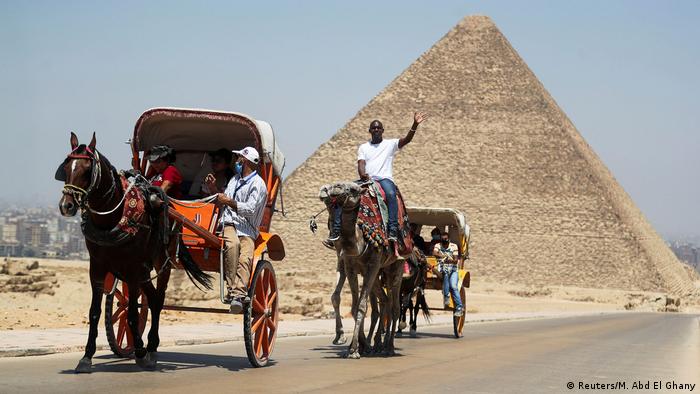
Visitors had been barred from the pyramids for three months
02:10 Australian police set up checkpoints in Melbourne to contain new coronavirus hot spots in the country's second-largest city.
Images published by the Australian Broadcasting Corporation showed police stopping cars after 36 suburbs in Melbourne went into lockdown following a spike in new infections.
"Over 300,000 Australians ... are going into a difficult situation, which we've all been through," Federal Health Minister Greg Hunt told reporters, referring to the residents of the affected suburbs. "We know we can get through it but nevertheless it's a huge imposition on their lives."
Australia has fared better than many countries in the pandemic, with around 8,000 cases, 104 deaths and fewer than 400 active cases.
01:20 The United States reported over 52,000 new coronavirus infections in the past 24 hours, according to a tally by John Hopkins University. The number is a new one-day record.
The tally showed 52,898 new infections in the US, bringing the total number of cases there to 2,682,270 since the outbreak began.
Another 706 COVID-19 fatalities increased the death toll to 128,028.
In recent days, the number of new daily infections in the US has been around 40,000.

Some US states are back to tightening rules to prevent the spread of the coronavirus
00:09 The Americas are still the epicenter of the coronavirus pandemic, with the United States and Brazil leading the globe in overall infections and fatalities from COVID-19. On Wednesday, Brazil hit the tragic milestone of 60,000 coronavirus deaths. In the US, governors of the states hit hardest by the virus have made moves to halt or reverse steps to ease restrictions originally put in place to slow the spread of the virus.
"The spread of this virus continues at a rate that is particularly concerning," said California Governor Gavin Newsom. The governor ordered his state to close all bars, ban indoor dining at restaurants, and restrict other indoor operations for over 70% of the state's population.
Within the US, the national epicenter has progressed from the Northeast to California, Arizona and New Mexico in the West as well as Texas, Florida and Georgia.
00:03 Mexico reported 5,681 new coronavirus infections in the past 24 hours along with 741 more fatalities, bringing the country’s total cases to 231,770 and total deaths to 28,510.
The latest deaths put Mexico ahead of Spain, a former coronavirus hot spot, in terms of overall fatalities from the virus. On Wednesday, Spain reported a total of 28,363 deaths related to COVID-19.
00:00 Catch up on yesterday's coronavirus news here.
In reporting on the coronavirus pandemic, unless otherwise specified, DW uses figures provided by the Johns Hopkins University (JHU) Coronavirus Resource Center in the United States. JHU updates figures in real-time, collating data from world health organizations, state and national governments, and other public official sources, all of whom have their own systems for compiling information.
Germany's national statistics are compiled by its public health agency, the Robert Koch Institute (RKI). These figures depend on data transmission from state and local levels and are updated around once a day, which can lead to deviation from JHU.
nm,kp/rs (AFP, AP, Reuters, dpa)
